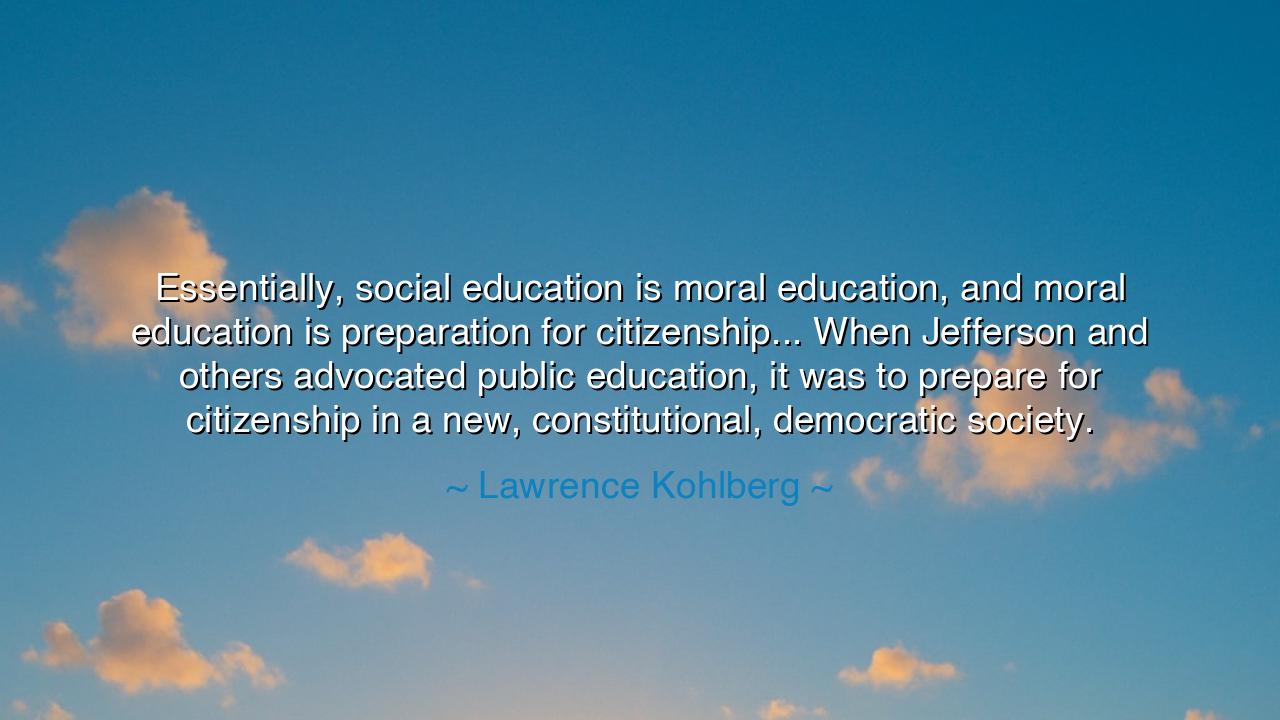
Essentially, social education is moral education, and moral
Essentially, social education is moral education, and moral education is preparation for citizenship... When Jefferson and others advocated public education, it was to prepare for citizenship in a new, constitutional, democratic society.






The words of Lawrence Kohlberg, the great moral philosopher and educator, strike like a timeless chord upon the conscience of civilization: “Essentially, social education is moral education, and moral education is preparation for citizenship... When Jefferson and others advocated public education, it was to prepare for citizenship in a new, constitutional, democratic society.” In this declaration, Kohlberg summons us to remember that education is not merely the accumulation of facts, but the cultivation of virtue—that learning, at its highest purpose, shapes the moral soul as much as the intellectual mind. His words recall an ancient truth: that no nation can endure unless its people are taught not only how to think, but how to live rightly among one another.
To understand the origin of this teaching, one must look both backward and inward. Lawrence Kohlberg, born in the twentieth century, stood at the crossroads of psychology, philosophy, and civic ethics. He developed a theory of moral development, teaching that humans ascend through stages of ethical understanding—from obedience to law, to empathy for others, to the ultimate recognition of universal moral principles. To him, the goal of education was not to produce obedient subjects, but thinking citizens, guided by justice and conscience. His invocation of Thomas Jefferson and the founders of the American republic was deliberate. Jefferson did not seek education merely to train the skilled worker or the clever merchant—he sought it to form the moral citizen, one capable of reasoned freedom, one who could govern not only a nation, but himself.
“Social education is moral education,” Kohlberg writes, and in these words lies a profound law of civilization. Every society teaches its children what it values most—through its stories, its teachers, its institutions, and its silence. If a society teaches only skills, it creates cleverness without conscience. If it teaches only obedience, it breeds servitude without soul. But if it teaches morality—justice, empathy, courage, and civic duty—it plants the seeds of true citizenship. For the citizen, unlike the subject, is not ruled by fear or habit, but by understanding. He knows that freedom demands self-restraint, that rights demand respect, and that democracy demands wisdom as much as passion.
Kohlberg’s insight finds its roots not only in Jefferson, but in the traditions of the ancients. Aristotle, centuries before, proclaimed that “the city exists not only for living, but for living well.” To him, education was the training of both mind and character; it was how free men prepared themselves to rule and be ruled in turn. The Spartans taught courage and discipline; the Athenians, debate and reason. Yet both knew that without moral virtue, knowledge could turn destructive. Even the most enlightened society, if stripped of ethics, collapses into tyranny or chaos. Thus, when Jefferson envisioned schools for the young republic, he did not see them as temples of arithmetic and grammar alone, but as foundries of moral citizens, in whose hearts the experiment of liberty could endure.
History offers proof of Kohlberg’s wisdom. Consider the fall of the Roman Republic. For centuries, Rome had produced citizens of discipline, devotion, and civic virtue. But as wealth and conquest swelled its power, education turned from moral duty to material ambition. The youth were taught to speak well, not to act well; to win, not to serve. The result was a society rich in intellect but poor in virtue—a nation of citizens without citizenship. Ambition devoured principle, and the republic gave way to empire. This, Kohlberg warns us, is the fate of all civilizations that forget that education and morality are inseparable—for knowledge without ethics becomes the servant of greed and power.
But Kohlberg’s message is not one of despair; it is a call to renewal. He reminds us that each generation must rebuild the moral foundation of its democracy through education. In the classroom, at the dinner table, in public discourse, and in the halls of law, we must teach not only the “how” but the “why.” We must awaken in the young the sense that citizenship is a sacred trust—one that requires courage to question, humility to listen, and integrity to act for the good of all. Moral education does not end with childhood; it is the lifelong art of becoming human in community with others.
Let us take from Kohlberg’s words a lesson both urgent and enduring: that the strength of a nation lies not in its armies, its wealth, or its technology, but in the character of its citizens. To prepare the next generation for freedom, we must teach them not merely to succeed, but to serve; not merely to argue, but to understand; not merely to demand their rights, but to fulfill their responsibilities. Education must therefore begin and end with the question: What kind of person do we wish our society to produce? For as the citizen is, so shall the nation be.
Thus, in the spirit of Kohlberg and Jefferson, we must remember: a free society can survive ignorance, but not moral apathy. The republic is not sustained by laws alone, but by the moral education of its people. Every teacher, every parent, every leader who inspires virtue performs the oldest and noblest labor known to humankind—the shaping of souls fit for liberty. And so, let education be not only the training of the mind, but the awakening of the conscience, for only then will democracy live not as an institution, but as a living spirit within the hearts of its citizens.






AAdministratorAdministrator
Welcome, honored guests. Please leave a comment, we will respond soon